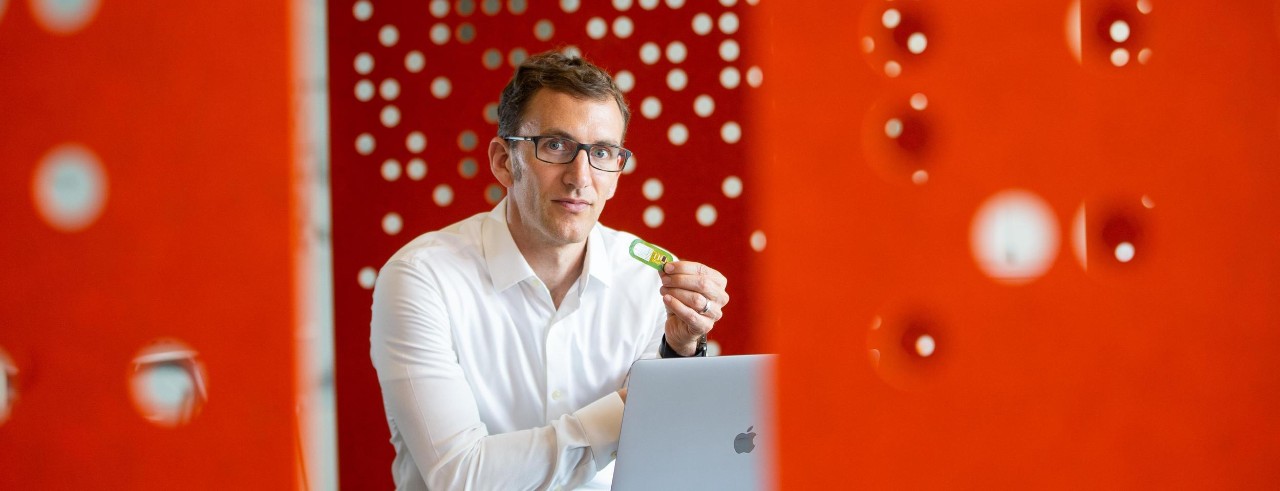
MarketScale: Labor shortages are driving growth of wearable heart tech
Biomedical engineering professor explains why new devices are in such high demand
MarketScale turned to a biomedical engineering professor at the University of Cincinnati to explain the high growth of wearable technology in the field of cardiovascular medicine.
UC College of Engineering and Applied Science Professor Jason Heikenfeld said companies are trying to replicate the success of home blood-glucose monitoring for diabetes with other chronic illnesses such as heart disease.
“Cardiovascular disease is coming for all of us,” Heikenfeld told Marketscale. “If you look at the states, at age 60 you have a 50% chance of having cardiovascular disease. It's something that will affect all of us, especially as the population ages.”
In his Novel Device Lab, Heikenfeld and his research team have applied for more than 100 patents on a variety of new sensors and wearable technology.
Heikenfeld said labor shortages in health care are driving the growth of home-health monitoring and wearable technology.
“For hospitals and providers, there’s a huge push to decentralize medicine and get it out of the clinic,” he said. “Doing things in-clinic is costly. And we have an infrastructure bottleneck. So we need to find ways to streamline things and make them more efficient.”
Heikenfeld said researchers working on the next generation of sensors are using the latest glucose monitors for inspiration.
“They are total works of art,” he said. “They’re beautiful. They last for two weeks. They’re disposable. They’re affordable. They’re highly accurate. Patients apply them and most don’t feel any pain or anything whatsoever, so patients are happy with them.”
Related Stories
NYT: Collective force increases odds of football concussions
June 20, 2023
The New York Times turns to biomedical engineering professor and concussion expert Eric Nauman to explain the significance of a new study linking the collective force of hits in football with concussions.
WCPO: UC engineer explains design of Joe Burrow's new helmet
July 26, 2023
WCPO talks to UC biomedical engineering Professor Eric Nauman about Cincinnati Bengals quarterback Joe Burrow's new helmet and the risks of concussion in the NFL.
Local news highlights opening of UC Bioscience Center
August 17, 2023
Cincinnati news outlets covered the opening of the University of Cincinnati's Bioscience Center, which will collaborate with doctors to create groundbreaking medical technology.
MarketScale: Labor shortages are driving growth of wearable heart tech
September 8, 2023
UC biomedical engineering Professor Jason Heikenfeld talks to MarketScale about the growth of wearable technology in diagnosing and treating heart disease.
An animated goat helps kids with pronouncing 'R' sounds
May 29, 2024
A collaborative effort between researchers at the University of Cincinnati is helping children overcome difficulties in pronouncing certain sounds, including “R,” Spectrum News and Local 12 reported.
Phys.Org: How can computer chips predict the future of gene synthesis?
March 4, 2022
News outlets highlight a study by the University of Cincinnati that used the evolution of the microchip to predict advances in synthetic biology.
Dayton Inno: UC alumni develop wearable safety device for runners
October 28, 2021
University of Cincinnati biomedical engineering graduate Jack Randall is developing a wearable safety device for runners and cyclists. Zoza, a small, wearable SOS device, can be attached to a shoe or zipper and is intended for endurance athletes who often don’t carry a phone or who travel through remote areas. A user can press a button to send an emergency alert and the device even works in locations where cell service is unavailable.
WVXU: UC researchers invents lab-on-a-chip device for cancer
February 10, 2021
WVXU talks to UC College of Engineering and Applied Science professor Leyla Esfandiari about her point-of-care device that enables noninvasive point-of-care testing for cancer using biofluids.
Women of Cincy: Breaking the barriers of STEM
March 1, 2023
Women of Cincy spoke to Assistant Dean Whitney Gaskins in the University of Cincinnati's College of Engineering and Applied Science about her foundation, helping marginalized populations feel welcome at UC and the people in her life who made a difference.
WCPO: UC students work on COVID-19 surveillance to prevent surge
January 31, 2024
WCPO highlighted the Ohio Department of Health's COVID-19 surveillance program that UC engineering students oversee. UC Associate Professor David Wendell recruits students to help monitor wastewater to track the virus on campus.
